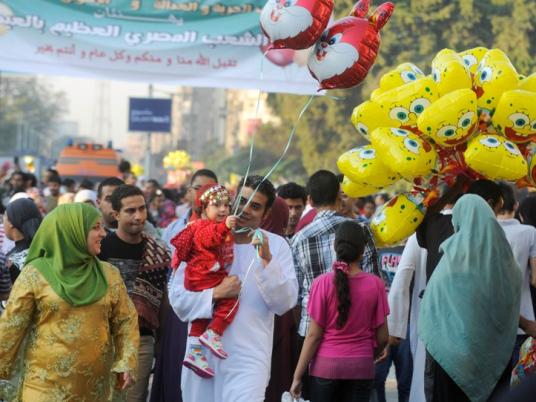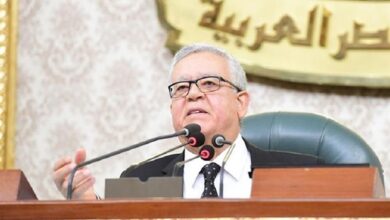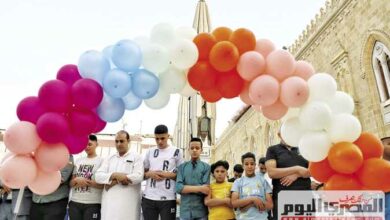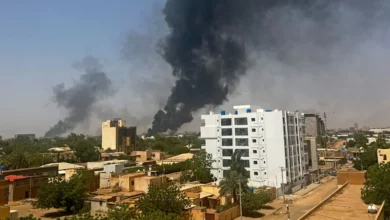
The third day of Eid sees the usual holiday headlines about the hajj pilgrimage, sexual harassment cases in the festive streets of Egypt and a just a dash of politics.
But when politics is right into your court, you might as well see the mix. The Freedom and Justice daily, which hails from the Brotherhood’s Freedom and Justice Party to which the current President Mohamed Morsy belonged, ran a headline about Morsy’s visit to his hometown in Sharqiya to celebrate Eid holidays.
In a tradition reminiscent of the state press under the old regime, where news about the president, however trivial, has to make it on the front page, Freedom and Justice’s headline reads, “The president prays Fajr in Zagazig (in Sharqiya) without any guards.” It goes on, “He met his neighbors in Sharqiya and congratulated Qaradawy for Eid.” The rather abrupt reference to Youssef al-Qaradawy, a renowned Islamist preacher who was threatened with arrest in Dubai for spreading Brotherhood ideology, came from Qaradawy’s Twitter feed.
The state-run Al-Ahram newspaper opted for a similar headline, albeit on the third page, with the lead reading, “Morsy meets his people in Sharqiya away from all forms of protocols.” The story moves on to the intricate details of how Morsy spent the day in Zagazig, including who he ate dinner with.
A less flowery Eid account is featured in the privately-owned Tahrir daily, whose front page leads with reports from rights organizations claiming that 60 percent of girls walking in the street during the first days of Eid were subjected to harassment. The reports say that harassers range in age from eight to 20 years old, and assaults include both verbal and physical harassment. Mostafa, a 15-year-old quoted by one of the monitoring organizations’ volunteers, said that the girls are to blame for taking to the streets on Eid days, knowing that harassment could happen. According to him, these girls fish for harassment, while for the boys, there is no sexual pleasure in harassing girls physically; it’s just a competition among themselves over who can get to a particular girl.
Equally dour is the dash of politics in today’s papers, which suggests no prospects for agreement on the upcoming constitution. Indeed, young Mostafa’s thoughts on his entitlement to harass girls is symptomatic of one of the deep disagreements over women’s rights in Egypt’s upcoming social contract.
The liberal party-owned Wafd daily lead with the headline, “Disagreements are tearing the Constituent Assembly apart before the voting begins on the constitution. Morsy calls for a meeting with political forces to evade the crisis.”
The crisis, as presented by Wafd, surrounds the Salafi Nour Party’s categorical rejection of the working draft’s article providing for equality between men and women. According to Wafd, party members refrained from attending three recent meetings at the assembly for dialogue, entrusting Muslim Brotherhood members to object to the article establishing equality between men and women, even with the compromising addition of the fragment “according to Sharia rules.”
The paper also reported that the assembly’s spokesperson, Wahid Abdel Meguid, urged its head, Judge Hossam al-Gheriany, to hold an emergency meeting before the draft is completed by 4 November. Presidential sources also said Morsy would hold a meeting to salvage the assembly’s work from imminent failure.
In contrast to Wafd’s ominous language, Freedom and Justice decided to remain festive, even on the murky subject of the constitution. The paper claimed that a draft is ready to come out after Eid. Even though Morsy is set to meet with some members of the assembly to resolve certain disagreements, his intervention isn’t really needed since all disputes have been settled without any support from the executive branch, the paper claimed. “This promises of a representative constitution for all Egyptians,” a source from the assembly is quoted as saying by the paper.
Commenting on Salafis and hardline Islamists’ anxiety over the application of Sharia, Khaled Fahmy used his common tactic of resorting to history to explain how superficial and flawed the demand is. In his weekly column in the privately-owned Al-Shorouk, Fahmy wrote about the gap between the ambition of the application of Sharia rules, and their translation into a set of implementable laws — a gap which Sharia advocates seem to ignore.
He referred to when Abbasid caliph al-Mansour assigned Imam Malik to write a book where he would collect all divergent views and interpretations of Islam. When Malik finished the work, the caliph thought it was an excellent work, and wanted it to become a unified Islamic law for the umma at large. Malik, however, vehemently objected the idea, deeming it divisive to Muslims everywhere. For him, reducing religion into a unified set of laws would endanger jurisdiction, which only thrives on the diversity of its schools. For Salafis, Fahmy wrote, Malik can be charged of the same accusations they are throwing at their political others today, namely a lack of political will to turn Sharia into a set of applicable laws, when in reality, the quest itself is a reductionist one.
Even more oblivious to typical Eid news is the Watan privately-owned daily, known for its intel-inspired coverage. Its front page story breaks the news of the identification of three terrorist cells with members from Tunisia, Libya and Palestine which were allegedly plotting a series of assassinations, one of which would target Morsy on the first days of Eid.
Al-Ahram: Daily, state-run, largest distribution in Egypt
Al-Akhbar: Daily, state-run, second to Al-Ahram in institutional size
Al-Gomhurriya: Daily, state-run
Rose al-Youssef: Daily, state-run
Al-Dostour: Daily, privately owned
Al-Shorouk: Daily, privately owned
Al-Watan: Daily, privately owned
Al-Wafd: Daily, published by the liberal Wafd Party
Youm7: Daily, privately owned
Al-Tahrir: Daily, privately owned
Freedom and Justice: Daily, published by the Muslim Brotherhood's Freedom and Justice Party
Sawt al-Umma: Weekly, privately owned
Al-Arabi: Weekly, published by the Nasserist Party
Al-Nour: Official paper of the Salafi Nour Party




